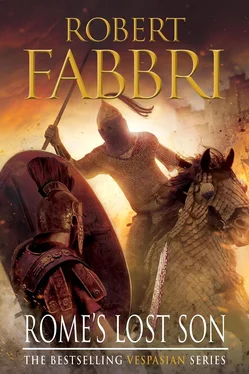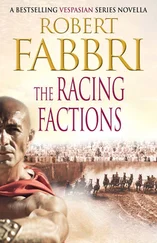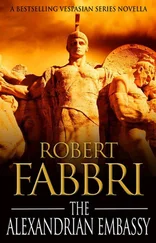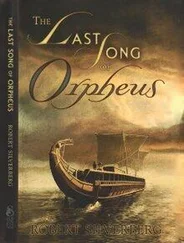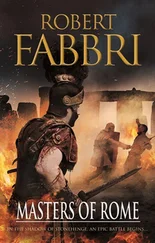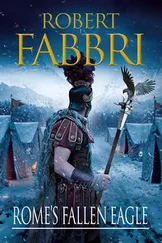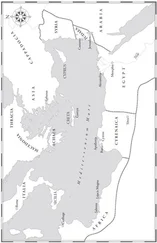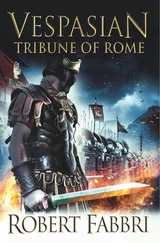Robert Fabbri - Rome's lost son
Здесь есть возможность читать онлайн «Robert Fabbri - Rome's lost son» весь текст электронной книги совершенно бесплатно (целиком полную версию без сокращений). В некоторых случаях можно слушать аудио, скачать через торрент в формате fb2 и присутствует краткое содержание. Год выпуска: 2015, ISBN: 2015, Издательство: Atlantic Books, Жанр: Исторические приключения, на английском языке. Описание произведения, (предисловие) а так же отзывы посетителей доступны на портале библиотеки ЛибКат.
- Название:Rome's lost son
- Автор:
- Издательство:Atlantic Books
- Жанр:
- Год:2015
- ISBN:9780857899668
- Рейтинг книги:5 / 5. Голосов: 1
-
Избранное:Добавить в избранное
- Отзывы:
-
Ваша оценка:
- 100
- 1
- 2
- 3
- 4
- 5
Rome's lost son: краткое содержание, описание и аннотация
Предлагаем к чтению аннотацию, описание, краткое содержание или предисловие (зависит от того, что написал сам автор книги «Rome's lost son»). Если вы не нашли необходимую информацию о книге — напишите в комментариях, мы постараемся отыскать её.
Rome's lost son — читать онлайн бесплатно полную книгу (весь текст) целиком
Ниже представлен текст книги, разбитый по страницам. Система сохранения места последней прочитанной страницы, позволяет с удобством читать онлайн бесплатно книгу «Rome's lost son», без необходимости каждый раз заново искать на чём Вы остановились. Поставьте закладку, и сможете в любой момент перейти на страницу, на которой закончили чтение.
Интервал:
Закладка:
It was just an intuition at first. There was nothing visible through the torrent and no sound carried over its incessant beating on wood and water but, with less than an hour until dawn, Sabinus was sure that they were not alone. He wiped the rain from his eyes and squinted into the continuing deluge; it was a black wall of water occasionally penetrated by a glimmer of light from the town over a mile away. But then a new sensation pierced his consciousness: a sound, very faint, but certainly a sound other than the driving rain and the creak of timber and stretching rope as the ship strained against the power of the sea. There it was again, long and low. Sabinus counted to five and the noise was repeated; there could be no doubt now: it was a steady rhythm, the massed grunts of exertion of scores of oarsmen pulling in time.
He turned, raised his arm at the trierarchus and signalled to move forward. Deck-hands at either end of the ship hauled on ropes and pulled in the anchors and, within a few moments, the shrill note of the stroke-master’s pipe heralded the first heave on the oars; they were under way.
‘Have your men load the ballista, Thracius,’ Sabinus ordered the marine centurion, ‘and check that the deck-hands are manning the corvus and standing by with grappling hooks.’
Thracius saluted and went about his business as the trireme gained momentum with each successive, quickening stroke. Around Sabinus the ship burst into activity as the carroballista’s torsioned arms were wound back; deck-hands manned the pulley system that would release the spiked corvus to slam down and pinion an enemy ship, creating a bridge, while marines checked their kit and sailors were stationed along the rails and in the bow with grappling hooks at the ready. The straining groans of the oarsmen intensified as they pulled on creaking sweeps, accelerating the huge vessel; they were augmented by those from the three biremes, one to either side and one behind, creating a cacophony of human effort that Sabinus knew could warn the Parthians of their presence. But that did not concern him; there was nothing that he could do about it as it was impossible for so many men to row in silence. What did concern him, however, was spotting the enemy ship before it evaded them; he stared forward into the night, his nausea forgotten, as the ram below him churned the black waters to foaming grey.
And then it was there; a darker shadow on a dark sea, dimly silhouetted by the port’s few lanterns behind it. Shouts from about the ship indicated that other members of the crew had also spotted the spectral blur. Imprecise and non-linear but certainly tangible, it grew more distinct with every grunted heave on the oars as the trireme sped forward towards its prey. Sabinus had given the trierarchus orders to intercept and ram and he felt the ship shift its course slightly to do just that. He smiled to himself and then, with a jolt, realised that the shade was not singular but, rather, split into three as one dark mass fanned out to starboard, another to larboard, leaving the third, the central one, less than fifty paces away, on collision course with the trireme. To either side a bireme split off to intercept the two fleeing ships.
‘Release!’ Thracius shouted. With an abrupt crack the two arms of the ballista slammed forward, hurling the bolt into the oncoming shadow; its impact registered with a hollow thump but no screams followed.
‘Brace!’ Thracius roared as the distance between the two vessels lessened dramatically; his men knelt on one leg, bracing themselves with their shields and javeline-like pila .
From the stern came a shouted order amplified by a speaking trumpet; it was followed by the mass rasping of oars being hauled inboard to avoid crippling damage should the enemy attempt to rake down one side. Sabinus gripped the rail and went down on his knees as the approaching shadow resolved itself into the outline of a trireme of equal size. And it was with equal weight and equal groaning of timbers that the two vessels ploughed into each other, colliding with their starboard bows. The corvus was released to screech down on its pulleys and crunch through the enemy’s rail, shattering it; but the ships were not aligned and the foot-long spike grazed down the side of the hull, failing to penetrate the deck. Their momentum drove the ships on, their rams ricocheting off curved hulls to slew them around, both to their larboard, in opposite rotations, out of control, their crews sprawled out on the deck.
Raising his head over the rail, Sabinus saw that the Roman vessel was spinning on its axis, right to left, its stern heading directly for that of the Parthian’s as it rotated, slowly, majestically, inexorably, in the contrary direction as if joining in some strange nautical dance. ‘Thracius, take your men back and try and secure us to them with ropes as we hit.’
The centurion picked himself up from the deck, shouting at the sailors with grappling hooks and his men to follow him. Sabinus watched with detached interest as the two ships swung towards each other. With a shuddering impact and the high-pitched grinding of labouring wood, they slammed together at roughly the point that Sabinus had vomited earlier. Thracius and his men tumbled to the ground only to get up again an instant later at the centurion’s bellowed commands as, from out of the darkness behind the trireme, surged the third Roman bireme, under full oars and at ramming speed. On it came, the groans of its labouring rowers clearly audible with every swift stroke, its bow ploughing a temporary furrow through churning water directly towards the Parthian’s beam.
And without loss of momentum the smaller ship drove into the trireme, punching its bronze-faced ram through the solid timbers of the hull, a foot below the water-line, with an explosive report that drowned the sound of human exertion and the forces of nature. Pushing deep into the Parthian’s belly, the bireme’s primary weapon ripped through its innards with an eruption of water until its bow, crunching into the vessel’s side, prevented further penetration but set the ship rocking, back and forth, grinding on the impaling ram and opening up the wound even more.
Then the grappling hooks hurtled through the air as Thracius formed up his men in preparation for boarding. The ropes were secured as the first arrows thumped in from the trapped ship, cracking into the marines’ shields or hissing unseen across the trireme and on into blackness; here and there a cry as a crewman spun to the deck with a fletched shaft quivering in his convulsing body. With a throat-rasping, inchoate roar, Thracius jumped up onto the rail and hurled himself onto the enemy ship; without any hesitation his men followed him as dark figures struggled to form up into a line of defence across the Parthian deck.
Sabinus got to his feet and walked back towards the stern. He was in no rush; it was not his business to risk life and limb in the menial task of clearing an enemy ship and, besides, Thracius and his men seemed to be doing a very competent job of it, having formed up in two lines and slammed into the defenders. Rain sheeted across the heaving deck on gusts of wind, further diluting the blood that slopped onto the soaked planking as iron clashed with iron, resounded on leather-bound wood and sliced through flesh and bone to the piteous screams of the maimed and dying.
To the rear of the marines, the Parthian steersmen and trierarchus lay dead beneath the steering-oars along with a couple of archers caught in the open as Thracius’ men had stormed the ship. Near the corpses, their Roman killers, a half-dozen marines, stood guard over the companionway leading down to the oar-deck; with long spears the marines stabbed at the terrified Parthian crew trying to escape the water flooding in below in order to prevent them from coming up behind their comrades, who were now pushing back the eastern, trouser-wearing defenders with the savage discipline that Sabinus expected of regular close-order Roman troops. Finding the route to safety barred, many of the rowers squeezed through the oar-ports to take their chances in the sea. Beyond them, the bireme was backing oars in an attempt to extricate itself from the crippled and visibly listing Parthian vessel; the blades whipped up the already roiling water so that men now floundering found their screams choked and their struggles useless. Many were sucked under while others suffered grim head wounds as the sweeps cracked into their skulls and faces. With the teeth-freezing squeal of grating and tearing wood on wood, the bireme edged back.
Читать дальшеИнтервал:
Закладка:
Похожие книги на «Rome's lost son»
Представляем Вашему вниманию похожие книги на «Rome's lost son» списком для выбора. Мы отобрали схожую по названию и смыслу литературу в надежде предоставить читателям больше вариантов отыскать новые, интересные, ещё непрочитанные произведения.
Обсуждение, отзывы о книге «Rome's lost son» и просто собственные мнения читателей. Оставьте ваши комментарии, напишите, что Вы думаете о произведении, его смысле или главных героях. Укажите что конкретно понравилось, а что нет, и почему Вы так считаете.
